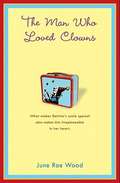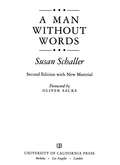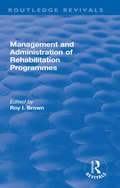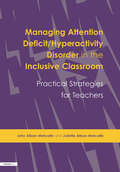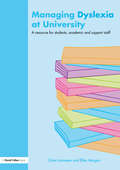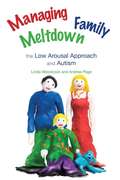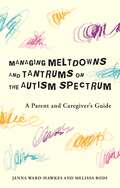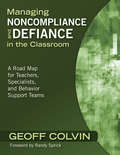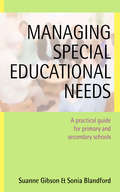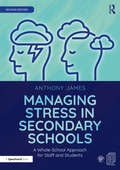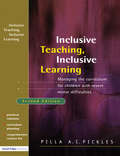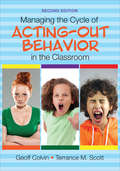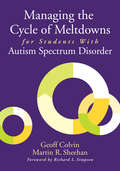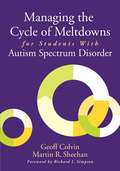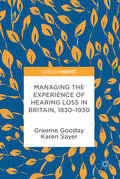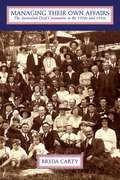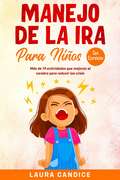- Table View
- List View
The Man Who Loved Clowns
by June Rae WoodThirteen-year-old Delrita, whose unhappy life has caused her to hide from the world, loves her uncle Punky but sometimes feels ashamed of his behavior because he has Down's syndrome.
The Man Who Loved Clowns
by June Rae WoodDelrita likes being invisible. If no one notices her, then no one willnotice her uncle Punky either. Punky is a grown man with a child's mind. Delrita loves him dearly and can't stand people making fun of his Down's syndrome. But when tragedy strikes, Delrita's quiet life—and Punky's—are disrupted forever. Can she finally learn to trust others, for her own sake and Punky's? This story captures the joy and sorrow that come when we open our hearts to love. .
A Man without Words
by Susan SchallerA Man without Words vividly conveys the challenge, the frustrations, and the exhilaration of opening the mind of a congenitally deaf person to the concept of language.
Management and Administration of Rehabilitation Programmes (Routledge Revivals)
by Roy I. BrownFirst published in 1984, Management and Administration of Rehabilitation Programmes addresses issues in management and administration across a wide range of areas relating to the education, welfare, and quality of life of those with disabilities. The book covers a variety of topics, including employment, the establishment of service priorities, and the evaluation of services and promotion of innovation. In each case, problems in management and administration are highlighted and explored. Management and Administration of Rehabilitation Programmes will be of interest to administrators and students of the history of special education.
Managing Attention Deficit/Hyperactivity Disorder in the Inclusive Classroom: Practical Strategies
by John Alban-Metcalfe Juliette Alban-MetcalfeThis book provides commonsense information and insights into the condition, and considers the: · key features of AD/HD and which warning signs to watch out for · educational implications for children diagnosed · pros and cons of using medication · case studies which demonstrate the successful and effective inclusion of children with AD/HD into mainstream classrooms · ways in which parents, teachers and schools can co-operate with other agencies to ensure best provision for the child The authors also provide guidance on writing Individual Education Plans, clear explanations of the statementing process and a discussion on the implications of whole school planning and multi-agency working.
Managing Dyslexia at University: A Resource for Students, Academic and Support Staff
by Ellen Morgan Claire JamiesonA thorough and comprehensive guide for both education professionals and those affected by dyslexia, this book is predominantly a guidebook. It includes lots of practical advice and is based on the authors’ sound knowledge of current theory and practice. It includes: photocopiable materials contact and reference details personal organisation advice ways forward for potential problems information on secondary or associated difficulties.
Managing Family Meltdown
by Andrea Page Linda WoodcockChallenging behaviour, violent outbursts and meltdowns can put a strain on the entire family of a child on the autism spectrum. This book offers practical, long-term and effective strategies to help resolve common challenging behaviours using a low arousal approach - a non-aversive approach based on avoiding confrontation and reducing stress and anxiety. Managing Family Meltdown provides explanations for challenging behaviours, and offers a wealth of guidance on how families can manage different types of challenging behaviour, such as physical aggression and self-injury. The authors explore the difference between managing and changing behaviour; how our own behaviour can influence the situation; and show how by reducing stress and anxiety children are better able to process information becoming less likely to react in challenging ways. The pros and cons of medication and ways to look after your own health are also discussed. This hands-on, practical book is appropriate for children who are non-verbal, as well as those with higher functioning autism and will be indispensable for families, carers and anyone involved with children on the autism spectrum.
Managing Meltdowns and Tantrums on the Autism Spectrum: A Parent and Caregiver's Guide
by Jenna Ward-Hawkes Melissa RodiThis book is ideal for parents and carers of children with autism spectrum disorder (ASD) aged 2 - 9 (and potentially older depending on developmental level), who are looking for guidance and proactive behavioural strategies in managing tantrums and meltdowns. It offers an empathetic approach and provides explanations of what goes on in the brain and body of someone experiencing a meltdown, describing sensory reactions and brain processes. The authors help the reader to distinguish between tantrums and meltdowns, and how to react to these different emotional states. Summarising key strategies, the book then provides short- and long-term strategies to implement, offering practical response plans and a toolbox of techniques that empower parents to further support their child.
Managing Noncompliance and Defiance in the Classroom: A Road Map for Teachers, Specialists, and Behavior Support Teams
by Geoffrey T. ColvinThis systematic approach to classroom management provides evidence-based strategies for assessing student insubordination and offers guidelines for developing individual intervention plans that improve cooperation.
Managing Post Polio: A Guide to Living Well with Post-Polio Syndrome
by Lauro S. Halstead Naomi NaiermanA book for those suffering from Post Polio Syndrome in all environments including social and vocational. The history of Polio and references for local Polio groups in the United States are included.
Managing Special Educational Needs: A Practical Guide for Primary and Secondary Schools
by Sonia Blandford Suanne Gibson'This is a most worthwhile book which contributes significantly to the general body of knowledge on managing pupils with special education needs. I found it interesting and informative. Schools cannot but benefit from the book's scope, and from insights into the many and varied aspects on SEN provision' - REACH `A particular strength of the book is the way in which individual chapters provided "self-contained" material which lends itself for use in school-based staff development activities. The book includes a lot of information that SENCOs, inclusion managers and members of school leadership teams should find useful' - SENCO Update `The strongest point about this book is that it gives a good overview of the history of special educational needs policy in this country, including recent development on inclusion' - TES Extra Special Needs 'It is a very practical account and should be a handbook for any newly appointed SENCO... [while] for experienced SENCOs and organisations where inclusion is not an issue, this book is a reminder of good practice' - Special Written from a practitioner's perspective, this book shows schools how to effectively implement and manage an inclusive school environment. Drawing from their experience in a range of schools, the authors highlight the problems encountered by professionals in both primary and secondary school settings and offer practical solutions and advice. The book offers guidance on: the role of the SENCO as a teacher and manager; government policy and legislation; self-evaluation, good practice and monitoring; how to relate SEN to school targets and development plans. Primary and secondary school teachers, headteachers, student teachers, SENCOs, LEA Advisers and professionals involved in the management of Special Educational Needs in schools will find the practical support offered in this book invaluable.
Managing Stress in Secondary Schools: A Whole-School Approach for Staff and Students
by Anthony JamesManaging Stress in Secondary Schools: A Whole-School Approach for Staff and Students, second edition, introduces a practical stress management programme for use in schools and colleges. Drawing from current theory and evidence-based practice on anxiety, stress and mental health, it offers student lesson plans, plus a staff self-training session, with concrete activities to develop crucial stress management skills in both staff and students. The programme provides direct training in stress reduction skills, supported by online resources, designed to fit into timetabled PSHE lessons. Key features of this manual include: Simple and flexible lesson plans that can be performed either at the start of timetabled PSHE lessons or as full stress management lessons on their own. A staff self-training session plan that serves both as preparation for leading lessons with students and facilitates the development of stress management skills among staff. Downloadable audio relaxation recordings. Downloadable handouts to encourage students’ relaxation practice at home. Downloadable PowerPoint slides to guide tuition. With lessons covering the causes and effects, as well as strategies on preventing and managing stress, this is an invaluable resource for teachers and other school staff involved in the PSHE curriculum. It would be of particular interest to those supporting students preparing for exams.
Managing the Assistive Technology Process: The Nontech Guide for Disability Service Providers
by James BaileyThis book focuses on the management of Assistive Technology in higher education. It written for a target audience of Disability Service Coordinators in college settings.
Managing the Curriculum for Children with Severe Motor Difficulties: A Practical Approach
by Pilla PicklesThis is a practical and imaginative guide to the management and education of children with severe motor difficulties. It is particularly useful for mainstream schools and also special schools and children at home.
Managing the Cycle of Acting-Out Behavior in the Classroom
by Geoffrey T. Colvin Terrance M. ScottMinimize problem behavior and maximize student success! Acting-out behavior by students manifests in ways that make classroom management and teaching very challenging. Building on a model using seven phases of acting-out behavior presented in the first edition, the newly updated edition draws on new research in applied behavior analysis, sound instructional principles, and functional behavior assessment to deliver a clear roadmap for educators to design interventions in a clear, systematic, and achievable matter. Features include: Managing each phase of the acting-out cycle—from structuring the classroom, to handling escalated behavior, to recovery Case studies that distill concrete action steps from the book’s concepts Checklists, tools, resources, and templates for applying the book’s principles to any classroom
Managing the Cycle of Acting-Out Behavior in the Classroom
by Terrance M. Scott Geoffrey T. ColvinMinimize problem behavior and maximize student success! Acting-out behavior by students manifests in ways that make classroom management and teaching very challenging. Building on a model using seven phases of acting-out behavior presented in the first edition, the newly updated edition draws on new research in applied behavior analysis, sound instructional principles, and functional behavior assessment to deliver a clear roadmap for educators to design interventions in a clear, systematic, and achievable matter. Features include: Managing each phase of the acting-out cycle—from structuring the classroom, to handling escalated behavior, to recovery Case studies that distill concrete action steps from the book’s concepts Checklists, tools, resources, and templates for applying the book’s principles to any classroom
Managing the Cycle of Meltdowns for Students With Autism Spectrum Disorder
by Geoffrey T. Colvin Martin R. SheehanHow to keep meltdowns from overheating your classroom This book outlines practical steps for preventing and responding to the various phases of meltdown behavior in students with ASD. Based on Geoff Colvin’s best-selling book, Managing the Cycle of Acting Out Behavior in the Classroom, this practitioner-friendly guide provides special and general education teachers with his seven-phase positive behavior support model that includes interventions for each phase. Readers will also find: An overview of the nature of autism and meltdown phases Case studies with examples of behaviors and plans A chapter on parent communication Prevention techniques for the early stages of the cycle
Managing the Cycle of Meltdowns for Students with Autism Spectrum Disorder
by Martin R. Sheehan Geoff ColvinBased on Geoff Colvin's bestselling book, Managing the Cycle of Acting-Out Behavior in the Classroom, this practitioner-friendly guide provides special and general education teachers of autistic students with a six-phase positive behavior support model that includes interventions for each phase. Outlining practical steps for preventing and responding to the various phases of meltdown behavior in students with autism spectrum disorder, you'll find: An overview of ASD Examples of meltdown behavior Common triggers Addressing sensory issues Establishing expectations and rules Collaborating with parents And much moreTeachers will find experienced guidance for providing a supportive environment in which students with ASD can succeed.
Managing the Experience of Hearing Loss in Britain, 1830–1930
by Karen Sayer Graeme GoodayThis book looks at how hearing loss among adults was experienced, viewed and treated in Britain before the National Health Service. We explore the changing status of ‘hard of hearing’ people during the nineteenth century as categorized among diverse and changing categories of ‘deafness’. Then we explore the advisory literature for managing hearing loss, and techniques for communicating with hearing aids, lip-reading and correspondence networks. From surveying the commercial selling and daily use of hearing aids, we see how adverse developments in eugenics prompted otologists to focus primarily on the prevention of deafness. The final chapter shows how hearing loss among First World War combatants prompted hearing specialists to take a more supportive approach, while it fell to the National Institute for the Deaf, formed in 1924, to defend hard of hearing people against unscrupulous hearing aid vendors. This book is suitable for both academic audiences and the general reading public. All royalties from sale of this book will be given to Action on Hearing Loss and the National Deaf Children’s Society.
Managing Their Own Affairs: The Australian Deaf Community In The 1920s And 1930s
by Breda CartyManaging Their Own Affairs explores how Deaf organizations and institutions were forged in Australia during the early 20th century. During this period, deaf people challenged the authority of the dominant welfare organizations, or Deaf Societies, which were largely controlled by hearing people and run as charitable institutions. Breda Carty comprehensively documents the growth of the Australian Deaf community and Australian Deaf organizations for the first time. She focuses on both the political developments of the early 20th century and on the nature of the relationships between deaf and hearing people. During this time, deaf Australians aspired to manage their own affairs. They enjoyed some success by establishing “breakaways” from the Deaf Societies, and they also established an independent national organization, which was contested and ultimately suppressed by the Deaf Societies. These developments were influenced by wider social movements in Australian society, such as the mobilization of minority groups in their push for autonomy and equal rights. Although most of the breakaway Deaf organizations did not survive beyond the 1930s, they significantly affected the power structures and relationships between deaf and hearing people in Australia. The Australian Deaf community’s attempts to organize independently during these years have been largely erased from collective memory, making Carty’s examination a particularly important and necessary addition to the historical literature.
Manejo de la ira para niños [con ejercicios]: Más de 19 actividades que mejoran el cerebro para reducir las crisis
by Laura CandiceEste libro inteligente tiene un objetivo claro, que es enseñar la mentalidad y los hábitos correctos que sus clientes deben adoptar en pasos muy simples para construir y mantener una familia iluminada y tener hijos felices sin pérdida de tiempo ni dolores de cabeza.
Mangold Basic Braille Program: Tactile Perception and Braille Letter Recognition
by Sally MangoldTeacher manual for braille instruction.
Mangold Braille Program Basic Nemeth Teacher’s Manual – Unit Instructions
by Sally MangoldTeacher manual for braille instruction.
Mangold Braille Program Basic Nemeth Teacher’s Manual - Introduction
by Sally MangoldTeacher manual for braille instruction.
Mangold Developmental Program of Tactile Perception and Braille Letter Recognition
by Sally MangoldTeacher manuals for braille instruction.

